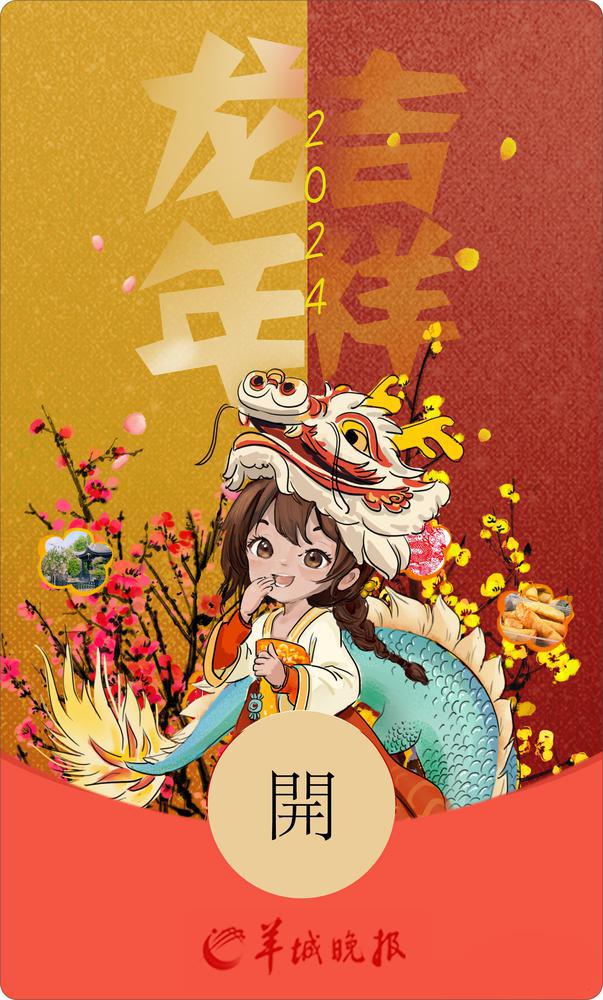
As the Chinese New Year of Dragon ends, working people are gradually returning to their regular routines. However, the young generation seems reluctant to bid farewell to the festival. They replace traditional couplets with digital devices, substitute large gift boxes with online gifts, and swap paper red envelopes with WeChat red envelope covers. Even the exchange of New Year greetings has taken a digital turn, with the use of stickers instead of traditional expressions.

The conventional notion of New Year goods has undergone a redefinition. Today, celebrating the New Year involves more than just traditional items like food materials for cooking delicacies. Young people have embraced a new trend known as "electronic New Year goods."
For the younger generation, visiting relatives and friends no longer holds the same priority. Apart from necessary visits, they prefer staying at home, creating an entirely new holiday atmosphere on their electronic devices.
What are "electronic New Year goods"?They refer to virtual products that provide a festive emotional value during the Chinese New Year, such as New Year red envelope covers, themed wallpapers on smartphones, greeting stickers, blessing card collections, membership cardsofvideo platforms, and so on.
The popularity of electronic New Year goods goes beyond mere novelty and convenience. Most importantly, these virtual products enable the young generation to fulfill their desire for private space and personal demands in the face of tedious and stressful social activities.
Qiuzi thinks that the Chinese New Year holiday is a golden time for everyone to relax and reward themselves, and electronic New Year goods provide young people with a unique way of celebration.
"When my parents buy traditional New Year goods such as delicious food or decorations, they are usually shared by the whole family. But the electronic New Year goods are purely for me. I won't tell my family about buying games or membership cards. It's a way to award myself during the New Year, for a year of hard work. Perhaps our generation is just adept at self-rewarding, which is why electronic New Year goods are so popular."
Hu Jia believes that electronic New Year goods offer her more freedom during the festival. "If a particular online game or event doesn't meet expectations, I can just leave. If I don't want to receive a red envelope, or if I'm not willing to give red envelopes, I can choose not to do so online. But real-life New Year visits are not as easy to avoid or escape from."
Perhaps, the unique way of celebrating the New Year among the younger generation is the symbol of technological progress, whether it's setting off virtual fireworks in a game, sharing stickers on social media, or sending and receiving red envelopes with different covers online. Different ways do not necessarily mean less involvement and enjoyment of the festival.
While savoring the traditional New Year goods at home, young people also delight in the electronic New Year goods, creating a different atmosphere for the New Year. They seamlessly navigate between the realms of reality and the virtual world, discovering a "double joy."
Source :Yangcheng Evening News
年轻人的春节复盘:“电子年货”让人获得“双倍快乐”?
龙年春节已然结束,“打工人”收拾状态陆续返工,但这届年轻人似乎仍然“意犹未尽”。他们把红火的春联换成数字化的新装,把硕大的礼盒缩进云端或存储卡,让图案丰富的微信红包封面取代纸质红包,而拜年表情包解放了绞尽脑汁的“新年好”文案……
传统的年货概念已经被重新定义。如今过春节,年轻人也办“年货”,却不再只是那些沉甸甸的鸡鸭鱼肉、煎炸炖炒的东西,还多了新潮的“电子年货”。
过年期间走亲访友,也不再是年轻人热衷的事,除了非去不可的拜访,年轻人似乎更愿意宅在家里,用一串串代码构建全新的节日气氛。
什么是电子年货?特指那些在春节期间提供“应节”情绪价值的虚拟商品,诸如新年红包封面、新年主题手机壁纸、拜年表情包、“集福”游戏卡、B站会员卡等,都可以称为“电子年货”。
“电子年货”之所以大受欢迎,其实并不仅仅因为它们的新颖、便捷,更重要的是,在高频、高压的社会活动中,这些虚拟产品满足了年轻人对于个性化和私人空间的需求。
秋子认为,春节假期是每个人放松身心、自我奖励的黄金时光,“电子年货”只是让年轻人在这个传统节日中找到属于自己的庆祝方式。
她说:“爸妈买年货通常都是全家共享的美食或装饰品,但我采购的‘电子年货’纯粹是为了自己准备的。我不会把我买游戏、游戏会员卡的事情告诉家里人。对我来说,这些是过年时自我享受的一种方式,是为了奖励自己一整年的辛勤工作。也许是因为我们这一代人太擅长于奖励自己了,所以‘电子年货’才会如此受欢迎吧。”
胡嘉认为“电子年货”能带给她一种“线上过年更自由”的感觉。“如果某个游戏或者活动不尽如人意,可以随时切换;如果不想给某人发红包或不想收某人的红包,也可以选择不发或不收,而现实中的拜年走亲戚则没那么容易‘逃脱’。”
也许,无论是在游戏中放烟花、在社交媒体上发表情包,还是通过手机屏幕收发不同封面的红包,年轻一代这种特有的过年方式其实代表着科技的进步,方式不同,并不代表他们减少了对节日的情感投入与享受。
年轻人一边享用着家里的传统年货,一边也享受着“电子年货”带来的新的“年味”,他们轻松地在现实和虚拟世界之间自由穿梭,也许能得到“双倍的快乐”。
文 | 记者 陈晓楠
图 | 资料图片(除署名外)
翻译 | 王枥焓
-
Guangdong's tourism revenue reached 69.36b RMB, hitting record high during 2024 Chinese New Year
2024-02-18 23:28:56 -
Tourists flock to Guangdong to celebrate the Chinese New Year
2024-02-18 23:28:46 -
DATA TALK |Guangdong-Hong Kong-Macao Greater Bay Area ranks among world's most important science and innovation centers
2024-02-18 22:04:45 -
Y Talk 51|How does Guangdong nurture new productive forces?广东着眼未来,布局新质生产力
2024-02-18 22:04:24






